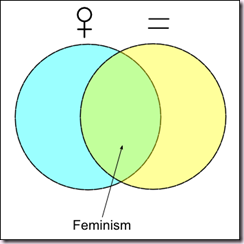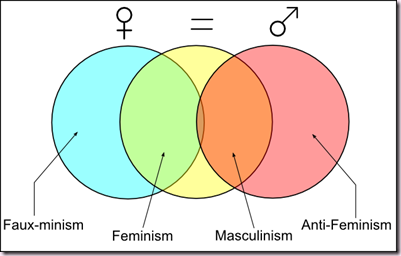Feminism is an interesting word. It means many different things to many different people. To some, feminism is almost synonymous with the legalization of abortion. Others may consider those values completely incompatible. I've heard feminism often described as "the radical idea that women are people," an idea that's hardly been radical in my lifetime. If I were to provide a definition for how I see it, it would be that feminism is the desire to remove from our society the cultural and legal inequalities between men and women which negatively effect women. Certainly, there will always be argument over what these inequalities are and how best to get rid of them, but I believe at the core are the things I stated above.

I used to think that feminism accounted for any desire to remove inequalities between men and women. I would rail against many discrepancies between how males and females were treated, and I wondered why other self-described feminists didn't rally behind me. Mostly, it's because I would rally behind ideas that would benefit men, but not so much women. Feminism doesn't take into account the needs and problems faced by men. It's not because of some inherent sexism within feminism; it's just not what it was made for. That was my misunderstanding of feminism.
On the other end, you have ideologies which want to make the world a better place for women, but to do so by creating inequalities (or at least strengthening existing ones) rather than destroying them. People in this camp will usually wave the banner of feminism, or "radical feminism." Of course, any ideology that supports any kind of inequality between men and women isn't really feminism (as per my definition). Because it so often self-describes as "feminist," however, I like to call it faux-minism1. I've run across a lot of this mindset on the internet, mostly because I'm an internet masochist and like reading sites catered towards people I disagree with.
One such site is a little chestnut called "I blame the patriarchy"; a nice little blog and accompanying message-board. This place is a goldmine for off-the-wall, no-holds-barred misandry, and it will probably serve as my whipping boy for some future blog entries, but I digress. Faux-minist writings that I've seen seem to avoid the idea that they're creating inequalities with sort of a "blank check" attitude towards them. That is to say that: they see the inequalities and discrimination against women as being so great that they could not be overcome in the foreseeable future, and that anything that makes things better for women, at the expense of men, could never shift the balance enough to set things so that they favour women overall, but would rather only move society closer to the (distant) middle-line of equality. I'm kind of half-making this up; I've never heard it actually described to me like that. It's more of a general impression I get from reading a ton of blog posts. I don't believe that society is really that stacked in men's favour (which is a post for another day), but even if it were; counteracting inequalities with more inequalities doesn't "balance things out." It's clumsy and inaccurate and just creates a more complex web of separate roles.
Most Men’s Rights blogs I've read suffer from the same problem, but with reversed genders. They seem to have an unhealthy interest with restoring traditional gender roles and the nuclear family, thus restoring previously weakened inequalities. Given the fact that the modern men's rights/masculinism movement was basically created to be a mirror movement of feminism, it seems logical that qualifications for what counts as masculinism is the mirror of what counts as feminism: any idea that seeks to remove inequalities which negatively effect men.
There's a middle ground, as set of changes we could make in society that's both masculinist and feminist, that removes inequalities and benefits both men and women. Removing violence and similar tough-guy ideals from society's idea of what it is to be a man is one example of this.
Even with the presence of common ground, though, there seems to be a weird kind of animosity between many feminists and masculinists, as though they were each other's enemy. I don't know why, though. Both camps have similar goals of ending sex-based discrimination; each one is just better at seeing and attacking different kinds of discrimination. After all, the most visible kind of discrimination for anyone is the kind against a group that person belongs to.
If feminists are trying to remove some kind of inequality, it is not the goal of masculinism to stop them; or visa versa. Eventually, if both parties keep removing inequalities against themselves, the barriers between men and women might not be so present.

1 Why does the French word for “fake” make such better portmanteaus than the English one?

